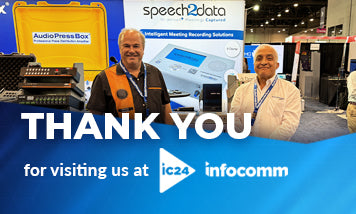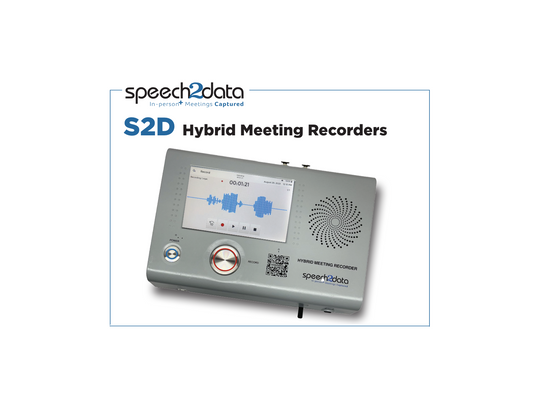The Future of Meeting Documentation: Revolutionizing the Role of Clerks with Advanced Recording Technologies
Share
The world has since become a global village and there is the continued need to accurately document meetings. From corporate boardrooms to municipal councils, the need for reliable, clear, and accessible meeting records cannot be overstated (Tillman, 2024). Meeting recordings serve as a vital tool for transparency, accountability, and future reference. Various recording technologies are available, each with its own set of advantages and challenges (Indeed, 2022). In this article, we explore these technologies and introduce groundbreaking advancements that promise to transform the way meetings are recorded, distributed, and archived.
This article also provides a comprehensive overview of the various recording technologies and highlights the advancements made by Speech2Data LLC. It underscores the importance of reliable meeting documentation and the potential of new technologies to enhance the efficiency and effectiveness of clerks' roles. A good starting point is an exposition of the recording technologies
Computers Used for Meeting Recording
Computers have become a common tool for recording meetings, especially with the rise of remote participation platforms like Zoom. Today, it’s more likely than not that your meeting is going to have at least one remote worker attending. The 2023 State of Hybrid Work report found that 88% of those surveyed said that their meetings had at least one remote participant (Owl Labs, 2022). The same State of Hybrid Work report found that 38% of companies are cutting back on business trips because video calls work just as well as in-person meetings. All of these are made possible by the help of a computer and other laptop devices.
However, when used by clerks for recording court sessions, computers may not always be set up to include remote participants effectively (Owl Labs, 2022). This often requires special meeting recording software, which adds another layer of complexity and cost. Typically, these solutions are provided by third-party vendors, necessitating costly annual maintenance and licensing agreements. Additionally, they require regular software updates and constant monitoring to ensure that they function correctly (FJA, 2023).
The quality of audio captured by computers can also vary greatly, depending on the hardware and setup used. This often necessitates the presence of IT professionals or technicians to ensure satisfactory audio quality (Gearspace, 2016).
Digital Phones
Digital phones are another option for clerks and businesspeople because they offer excellent audio quality when positioned correctly in the meeting room. The increasing use of digital phones for recording reflects their adaptability and the high-quality audio they can provide in well-controlled environments (Gamba, 2014). However, when used by clerks for recording court sessions or other formal meetings, digital phones can present several significant challenges. One major issue is the unpredictability of capturing Zoom participants. Because digital phones are not inherently designed to integrate with remote conferencing software, their ability to record remote participants consistently is limited. This often results in incomplete or unclear recordings of those not physically present in the room (FJA, 2023).
Archiving recorded meetings onto the municipality’s servers also requires technical assistance. Transferring files from digital phones to secure servers can be cumbersome, requiring additional steps and expertise to ensure that recordings are properly stored and accessible (Jones, 2020). Additionally, reducing background noise and identifying individual participants during recordings necessitate further technical support, which can be both time-consuming and expensive. The cost of updating and maintaining these devices adds another layer of complexity and a financial burden (Gearspace, 2016).
Handheld Digital or Cassette Recorders
Handheld digital or cassette recorders have long been favored for their portability and ease of use. These devices are often utilized in various settings, from business meetings to academic lectures, due to their straightforward functionality (Williams, 2019). They can be quickly set up, and users can start recording with just the press of a button. Despite their convenience, handheld recorders pose several significant challenges, particularly when used for recording official meetings such as court sessions.
One of the main issues with handheld recorders is the quality of the audio they capture. The internal microphones in these devices can vary greatly in performance, often resulting in recordings with inconsistent sound quality (Clark, 2018). This inconsistency is particularly problematic in environments where clear and accurate documentation is crucial, such as courtrooms. Furthermore, the limited range of these internal microphones means that they often fail to capture distant or softly spoken voices effectively. This can lead to incomplete or unclear recordings, which can be a major drawback for clerks who rely on these recordings for official records (Audio-Technica, 2022).
Standalone Tabletop Meeting Recorders
Standalone tabletop meeting recorders are dedicated devices designed specifically for capturing high-quality audio during meetings. These recorders are typically placed in the center of the meeting room and are equipped with advanced microphones that can pick up voices from all directions (Tech Trends, 2023). This makes them an attractive option for meeting environments where clarity and reliability are paramount.
However, despite their benefits, standalone tabletop recorders also present certain challenges. One issue is their limited ability to integrate remote participants, such as those joining via Zoom. While these recorders can capture in-room audio effectively, they may struggle to include the voices of remote attendees, which is increasingly important in today's hybrid meeting environments (Tech Trends, 2023). Additionally, like other recording technologies, these devices may require periodic maintenance and firmware updates to ensure optimal performance, which can add to the overall cost and complexity (Audio Engineering Society, 2023).
Cable/Community Audio/Video Closed Captioned
Cable and community audio/video closed captioned systems have traditionally been used to broadcast and record meetings, providing a means to share proceedings with a broader audience FCC (2022). These systems are particularly valuable for public meetings, allowing residents to stay informed about local governance and community events. The ability to provide closed captions enhances accessibility, ensuring that those with hearing impairments can follow along (accessiBe, 2024). However, despite these benefits, there are significant challenges associated with using cable and community audio/video systems for official meeting recordings.
One of the primary issues with cable and community audio/video systems is their inability to reliably capture remote participants (accessiBe, 2024). These systems are typically designed to broadcast what occurs in the meeting room, but they often lack the integration needed to include remote participants effectively. This can lead to incomplete records of meetings, especially in hybrid settings where remote participation is common. Additionally, the audio quality captured by these systems can vary significantly depending on the setup and the equipment used, which may not always be optimized for recording purposes (accessiBe, 2024).
Breakthrough Technologies from Speech2Data LLC
Recent advancements by Speech2Data LLC offer clerks innovative alternatives for meeting recording. https://speech2data.com/blogs/news/selecting-the-best-speech-to-data-applications As clerks adopt these advanced recording technologies, they can expect significant improvements in the quality and accessibility of meeting records. These products are designed to address the specific needs of clerks and other professionals who require reliable and high-quality audio recordings. These devices are easy to use, require minimal setup, and come preprogrammed with settings that ensure optimal performance (Speech2Data, 2024).
Speech2Data’s products stand out due to their ability to suppress background noise, identify individual speakers, and capture both in-room and remote participants seamlessly in one file. These features not only enhance the quality of the recordings but also simplify the process of archiving and distributing them. By incorporating such advanced technologies, Speech2Data is paving the way for more efficient and accurate meeting documentation, making life easier for clerks and ensuring that vital records are maintained with the highest level of fidelity (Speech2Data, 2024).
In conclusion, while traditional recording methods pose various challenges, the innovative solutions offered by companies like Speech2Data LLC promise to revolutionize meeting documentation. By embracing these technologies, clerks can enhance transparency, accountability, and efficiency in their roles.




